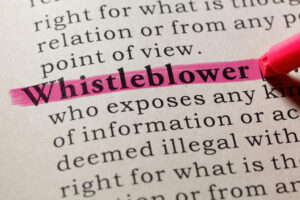By Jim Cline and Peter Haller
 In Noon v. Smedley,the Federal 8th Circuit Court of Appeals ordered that two Illinois police officers be reinstated after they had been fired in retaliation for expressing negative sentiments about the chief of police. The court held that the officers’ speech was protected under the first amendment.
In Noon v. Smedley,the Federal 8th Circuit Court of Appeals ordered that two Illinois police officers be reinstated after they had been fired in retaliation for expressing negative sentiments about the chief of police. The court held that the officers’ speech was protected under the first amendment.
In September 2019 the officers, Thomas Noon and Christopher Skidmore, sent an anonymous letter to the mayor. The letter was eventually leaked to the local newspaper. It detailed their concerns over the integrity of the Department’s leadership and cited over 180 alleged policy violations. Noon and Skidmore admitted to authoring the letter. Skidmore’s job duties were changed almost immediately, and by March 2020, both Noon and Skidmore had been fired.
Noon and Skidmore brought a lawsuit alleging that the retaliation against them was a violation of their first amendment right to free speech. They argued that the content of the letter was a matter of “public concern,” and thus, protected by the first amendment.
The City argued that the police department’s interest in maintaining efficient operations outweighed the officers’ right to free speech. The record showed that there were some instances of workplace disharmony because of the leaked letter. Even Skidmore himself testified that he had noticed relationships deteriorating among officers after the submission of the letter.
In considering both arguments, the Court applied the US Supreme Court’s “Pickering” balancing test. Under this test, a judge must balance a public employee’s right to free speech against the employer’s interest in maintaining the efficiency and reputation of the workplace. Courts will consider factors such as the nature of the workplace, the degree of public interest in the speech, and whether the speech impeded the employee’s ability to perform their duties.
The Court noted that the Department has a significant interest in promoting efficiency and public confidence. However, the Court also recognized that an employee’s first amendment interests should be given special weight in the context of whistleblowing. The Court reasoned that it would be absurd to silence whistleblowers simply for the sake of maintaining office harmony.
“The creation of disharmony cannot be so feared as to silence the critic who would inform the public of its misbehavior by public officials.”
The Court also noted that the content of the letter addresses matters which the public has a strong interest in, such as financial mismanagement, workplace misconduct, and serious investigative failures. After carefully balancing the interests of both parties, the Court ultimately concluded that the balancing test factors weighed in favor of the officers. In affirming their right to be free from retaliation for protected speech, the Court ordered that the officers be reinstated.
In the years following the 1967 Pickering decision, this would have been a very clear cut, almost “slam dunk” case in the officers’ favor. It is noteworthy that the Eighth Circuit relied so heavily on Pickering and provided only passing citation to the 2006 “Garcetti” decision, a more recent Supreme Court workplace free speech case. Garcetti has been highly criticized, has caused confusion about first amendment law, and increasingly lower federal courts seem to try to end run it.
Pickering provided strong protection for public employees to speak out on matters of public concern. Garcetti adopted a standard that if the speech was part of the employees required “job duties.” The practical problem with this problem is that many departments have policies that require employees to report misconduct. Under a strict reading of Garcetti, employees who report the misconduct may be just “doing their job” in a manner that eliminates first amendment protection.
Another important aspect of first amendment law not covered by these facts is that “union” speech is typically accorded a high level of protection. The plaintiffs here seemed to be acting as ordinary department members, not representatives of their bargaining unit. Notwithstanding the troublesome “Garcetti” decision, union advocates presenting complaints about the workplace or office corruption, as almost always seen as operating in their representative role with a well-recognized first amendment right to speak out.
**Visit our Premium Website for more information on Civil Rights of Public Safety Employees **


